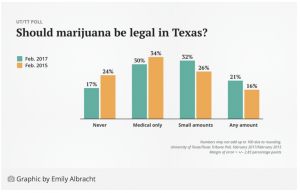Dissipate the smoke screen on medical marijuana
An idea that needs to be cultivated
The current Texas Legislative session ends May 29. State Sen. José Menéndez has filed Senate Bill 269, proposing an increase in accessibility and types of medical conditions currently covered under Senate Bill 339 – Compassionate Use Program, regarding the medical use of marijuana.
The bill will broaden the currently covered condition – intractable epilepsy. Proposed changes will increase covered conditions: cancer, glaucoma, HIV, Crohn’s, hepatitis C, agitation of Alzheimer’s, PTSD, autism, sickle cell and more. The bill would also expand the coverage to include severe pain and nausea.
The bill will update all references from “low-THC” cannabis to “medical” cannabis in an effort to allow increased strength and dosing options for those whose medical experts deem it necessary.
Additionally, the bill expands who can prescribe the medical marijuana. If passed, it can be prescribed by physicians and authorized physician assistants and registered nurses.
All drugs have the potential for harm. Aspirin, for example, has the potential to cause strokes, gastrointestinal bleeding and allergic reactions. Repeatedly there are publicized instances where medical marijuana has demonstrated benefits for chronic conditions.
Testamonial for the use of medical marijuana is presented by 9-year-old Anthony Abba’s mother Anna. Her son suffers from autism and was unable to perform as other children of similar age. With legal administration of marijuana while living in California, his mother noted reduced anxiety and digestive issues, and improvements in learning and sleep. His teacher also noticed an improvement in school, which his mother attributes to the calming effects of the cannabis.
Clif Deuvall, a proponent for medical marijuana, notes the harsh drugs prescribed for treatment of injuries sustained while serving in the Air Force were eating away at him. Marijuana allowed him to socialize again.
Cherie Rinekar is an advocate for the legal use of marijuana. Rinekar suffers from a bone-eating cancer. She states that opioids are a part of her medicinal treatment and comments that the opioids are dangerous and addictive; her preference is not to take them. Rinekar wants to be a healthy, functioning mom and claims that opioids make it difficult. She plans on meeting with lawmakers regarding medical marijuana.
Opposition to medical marijuana includes Texas Governor Greg Abbott who is on record as stating he will not allow it while he is in office and does not plan to open the door for marijuana use. No reason for his stance was provided in a recent KHOU broadcast.
Further opposition to medical marijuana includes the fact that it is not approved by the Federal Drug Administration (FDA), it is

prohibited by federal law (although some states have legalized its use), and a lack of research on the effects. Opponents state smoking marijuana is harmful and it has a high potential for abuse.
Currently, 28 states from Washington state to Washington D.C., allow the use of marijuana. President Donald Trump has said he supports states’ rights regarding the regulation of marijuana, although he has not yet taken a firm stance on the subject.
With 28 states and Washington D.C. currently legalizing marijuana, the FDA should have ample research material. The FDA should acknowledge medical marijuana as an experimental drug and consider approval and regulation or consider the drug as a supplement. Even FDA approved drugs have side effects. This does not mitigate their usefulness. Physicians and patients should always weigh benefits against side effects when determining a treatment plan.
Medical marijuana can be taken in many forms. The benefits are not exclusive to smoking. Medical marijuana can be extracted to a useable oil. It can be prepared in edible forms for ingestion. It can be smoked by adults making a conscious decision to do so, as with tobacco. The potency is varied depending on the type of plant, the parts of the plant that are used, how it is grown and how it is prepared.
Marijuana is no more prone to abuse than other legal or illegal drugs. Opioids are commonly prescribed for the treatment of many ailments and are legal, FDA approved and prescribed by physicians. For example, Vicodin and Oxycontin are highly addictive.

It is unrealistic to believe that the societal ills associated with illegal marijuana use would increase due to people legally using it for medicinal purposes. The time has come for approval for the use of medical marijuana.
In a recent poll by the University of Texas and Texas Tribune, 83 percent of those polled believe marijuana should be legalized—30 percent for medical use only, while 32 percent believe it should be legal in small amounts for any reason and 21 percent in any amount for any reason. A mere 17 percent of those polled believe it should not be legalized.
State leaders are elected to represent the people. State Bill 269 has been filed. Contact your senators and representatives and advise them of your views on medical marijuana. It is time to update the laws and cultivate the legal use of medical marijuana.

